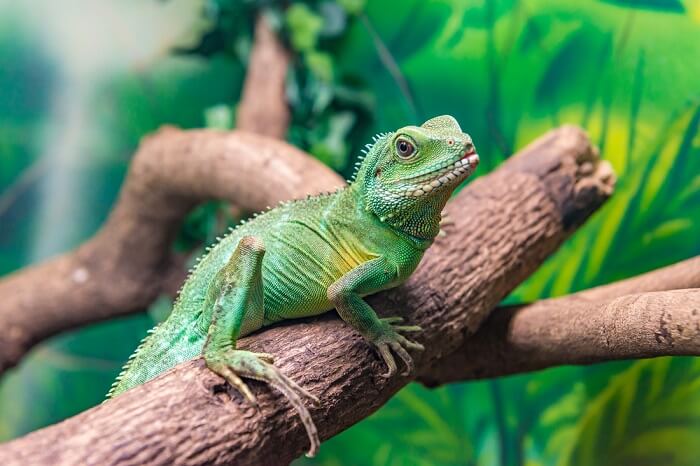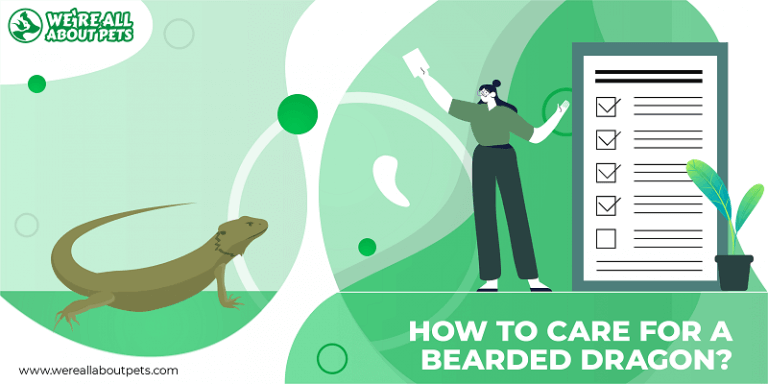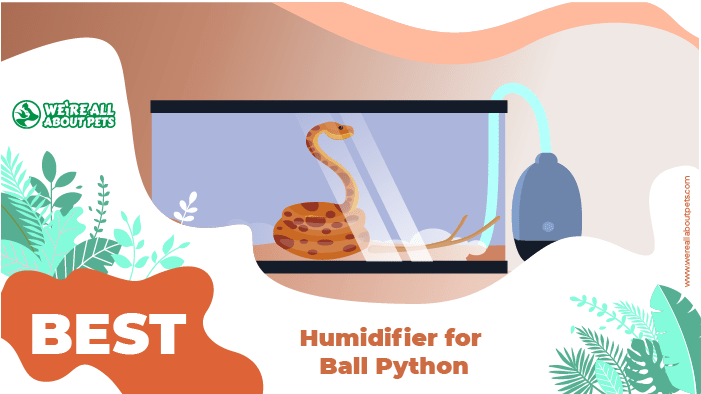What Do Lizards Eat According to a Veterinarian
This page contains affiliate links. We may earn money or products from the companies mentioned in this post through our independently chosen links, which earn us a commission. Learn More
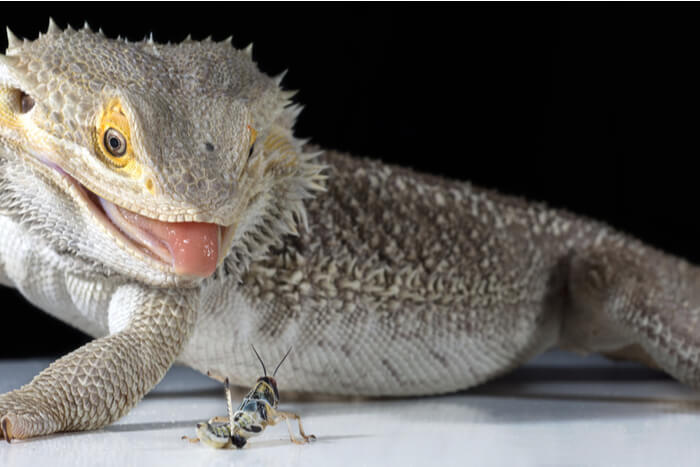
Lizards are a very large group of animals that includes a great deal of diversity. In fact, in many cases they’re only as closely related to each other as we are to other primates. They live on every continent of the planet except for Antarctica. As such, there can be a great deal of difference in the diets of different lizards.
This article will provide some guidance and some general rules that can be applied to the diets of many of the pet lizards that we commonly see. It’s designed to introduce you to the world of lizard nutrition, but not as a guide for a specific pet.
To decide what’s best for your pet, use this guide and do further research into the specific needs of that species of lizard.
Just like you, proper nutrition is an important aspect of care to make sure your lizard is healthy and happy.
With good nutrition, you lizard has a far better chance to live a full and fulfilling life. Since lizards are such a diverse group, there are some that are herbivores, many that are omnivores and some others that are carnivores.
Some of the foods that they consume will be similar, so we’ll cover some of the similarities and differences in this article.
What Vegetables And Fruits Can Lizards Eat
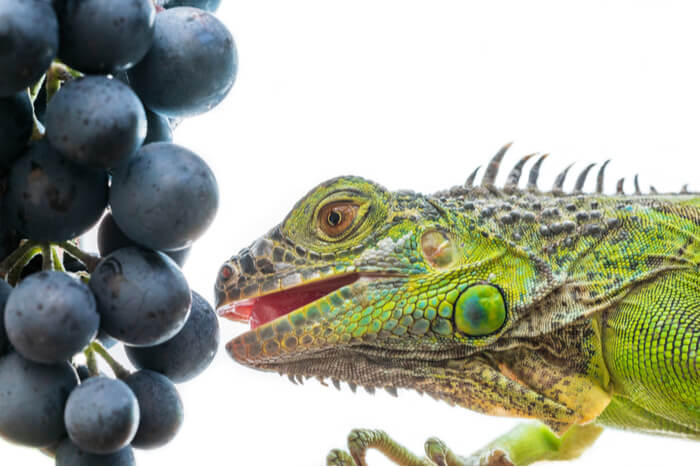
A large portion of pet reptile species are either herbivores (like the green iguana) or omnivores (like the bearded dragon). They will all eat some sort of a mixed salad for an important part of their normal diet.
Variety is the key for most of the feedings. Different vegetables have different levels of nutrients, minerals and vitamins. By mixing it up, you help ensure the best chance of balanced nutrition.
For lizards, organic vegetables are always recommended since they’re very small animals with a slow metabolism and only a small amount of pesticide residue may have dangerous effects.
Best vegetable choices For lizards
The vegetables on this list form a good base of nutrients and can be fed regularly to most lizards as part of a healthy diet.
- Dandelion greens
- Green-leaf lettuce
- Red-leaf lettuce
- Romaine lettuce
- Spring mix
In addition to those as a base, these vegetables can be rotated into the mix to provide a variety in the salads:
- Acorn squash
- Asparagus
- Basil
- Bell pepper
- Bok choi
- Butternut squash (steamed)
- Carrots
- Cucumber
- Green beans
- Okra
- Zucchini
Some other vegetables that can be added, but less frequently because they’re high in some nutrients that should be limited to avoid health problems like bladder stones, or their starch /sugar content is high:
- Beets (steamed)
- Cherry tomatoes
- Corn
- Dill
- Kale
- Oregano
- Radishes
- Spinach
- Sweet potato
Fruits should be used as occasional treats, maybe 1-2 times per week for a small serving. Generally, they’re higher in simple sugars and that can affect the normal flora of the intestines and affect digestion. that can be offered to lizards include:
- Apple (no seeds)
- Banana
- Blackberries
- Blueberries (good source of anti-oxidants)
- Grapes
- Kiwi
- Mango
- Raspberries (really fun to watch!)
- Strawberries
- Watermelon
Finally, there are some fruits, vegetables and other foods to always avoid. NEVER FEED these to lizards:
- Avocado
- Chocolate (it’s from a bean, so it counts as a vegetable, right?!)
- Citrus (can be upsetting to the stomach from the acidity)
- Dairy
- Onion
- Rhubarb
- Seeds of any fruit (except strawberries)
- Anything from a yard that has been treated with any chemicals
Do Lizards Eat Meat
There are many lizard species as pets that are either omnivores or carnivores. They’ll need some form of animal protein in their diet. For most of our pet lizards that will be primarily insect protein. There are a few that require something more exciting.
Do Lizards Eat Insects
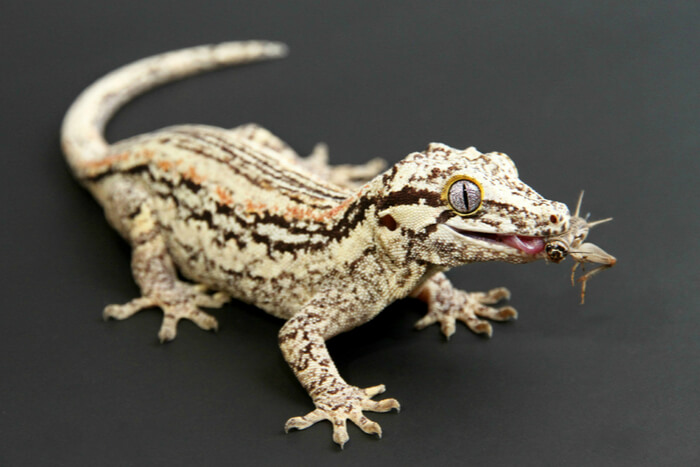
Insects are a common side dish, or even a primary food for many of the herbivores and carnivores. Bearded dragons, chameleons, geckoes, water dragons and many others will regularly feast on these crunchy delights. For a few specific pets, see our related articles on the best food for chameleons, best worms for bearded dragons, and best food choices for leopard geckos.
Most insects need to have supplemented calcium. Their exoskeleton (the crunchy outer shell) has much higher phosphorus than calcium. That affects how well calcium is absorbed in the same way that drinking too much soda will ultimately be bad for your calcium levels.
The most effective technique to offering good prey items is to feed the insects a healthy variety of vegetables. When you make the salad for your herbivore, you can stick the less desirable portions into the critter keeper that you use to house the bugs waiting to meet your pet.
When offering the insects, coat them in a calcium supplement to boost the calcium and help the ratio of calcium to phosphorus. On a schedule that depends on the specific animal, replace the calcium with a vitamin supplement. The supplements will be discussed more in depth later in the article.
Common insects fed to lizards include crickets, Dubia roaches, mealworms, hornworms, wax worms (high in fat), superworms, fruit flies, butterworms, Phoenix worms, earthworms and silkworms.
Some variety in the insects is good as well, just to ensure that the nutritional balance is maintained as well as possible. For safety, remove any insects not eaten in 10-15 minutes. They could pick at your lizard if left behind. You can read more detail regarding the nutritional value of some of these bugs here.
Other Animals
Fish are good supplemental food items for some of the lizards that spend more time around the water, like Chinese water dragons. They should be a small amount of the diet, but in the wild, these lizards will opportunistically catch small fish.
Many fish have enzymes that will break down vitamin B. This could be detrimental to the health of your lizard if they make up too much of the diet, but if they’re used as treats then the rest of the diet will compensate well enough to make it no concern.
Goldfish, minnows and any fish that was frozen and then thawed can be a problem for vitamin B if overfed.
A few larger lizards, like Savannah monitors, will eat other prey items. Mice, rats, birds or even smaller lizards may be common feeder animals.
I do recommend using frozen, thawed prey items. Not only is that safer for your pet lizard, but it’s far more humane than locking a prey animal in a small cage with its predator.
Supplements
As discussed before, calcium supplements should be used with all insect prey items. It may also need to be used for herbivores, depending on the variety of vegetables they’ll eat well.
There are many choices for calcium supplements. Liquids and powders are available, and generally both are good supplements. Some will come with vitamin D3 added to the supplement.
How Often Do Adult Lizards Need Supplements
Be aware that vitamin D3 can be overdosed and will cause serious health problems. It’s best to use the supplement without D3 for the daily use of most pets and provide vitamin D3 with the vitamin mix 1-2 times per week. Again, look for your pet’s specific recommendations in this regard.
Vitamin supplements are also plentiful in the market. Most are able to provide the other essential vitamins that are good for our pets. One thing to be aware of in your selection in the form of vitamin A.
Deficiency of that vitamin is a frequent health concern in reptiles. In our diet, beta-carotene is converted to vitamin A when we eat vegetables like carrots. However, many reptiles are unable to make that conversion, as shown in this research.
If the supplement’s ingredients list states “Vitamin A (as beta-carotene)” or something similar, then it may not be the most effective supplement. Any vitamin supplement should be given no more than 1-2 times per week, either way. Over supplementation of some of the fat-soluble vitamins can be toxic.
Water
Don’t forget about the importance of water in the health of your pet. Water should be always available in a clean dish to prevent dehydration.
Summary
The proper nutrition is important to the health of your reptile, just like the proper temperature, lighting, humidity, and substrate. Keep in mind, that one of the most frequent preventable diseases in pet reptiles is obesity.
Offering the right amount of food along with enrichment and opportunity for exercise is just as important as the food offered. The nutritional health begins with the correct foods that we have introduced here, but it’s part of a complete health plan just like it is for you and me.
Frequently Asked Questions
What do common house lizards eat?
The common house gecko is what that name usually refers to, and if you live in SE Asia or northern Australia, then that may be what’s around your house. They’ll eat insects all around your house and help keep those pests under control as a way of paying rent.
Do lizards eat vegetables?
Not all, but many. There are some lizards that are herbivores, so they only eat vegetables. There are many others that are omnivores, so eat a mix of meat and vegetables in their diet.
What can I feed a lizard in my backyard?
Nothing. It’s not good to feed wild animals. Food offered by us disrupts their place in the ecosystem and may be harmful. What you can do is avoid using pesticides around the areas that these lizards are hunting. Let them take care of your insects and keep them safe in that job by not using pesticides that can be harmful to them.






